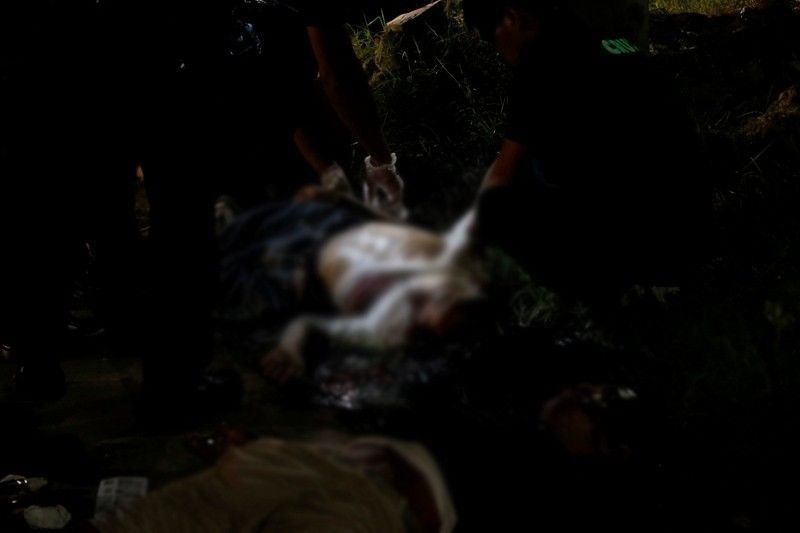‘Drug war records have no national security implications’

MANILA, Philippines — Records of the Duterte administration’s bloody war on drugs do not have national security implications, Senate Minority Leader Franklin Drilon said yesterday, citing a Supreme Court (SC) decision that should compel the Philippine National Police (PNP) to open documents for investigation by the Department of Justice (DOJ).
Drilon, a former justice secretary, mentioned the SC ruling on Almora et al. and Dano et al. v. the PNP in 2018 in commenting on President Duterte’s order to withhold records of the anti-drug campaign due to national security.
“In the words of the Supreme Court, drug war records ‘do not obviously involve state secrets affecting national security’ for the information and documents relate to routine police operations involving violations of laws against the sale or use of illegal drugs,” Drilon said in a statement.
“That is, plain and simple, a police blotter. (This is) public record and the people have the right to know the truth,” he said in mixed Filipino and English. “I do not think that by any stretch of the imagination police records would involve national security… We’re not hiding anything, are we?”
He said the PNP is walking a thin line between the high court’s order and keeping the records under wraps, but the police must abide by the ruling.
In 2018, the SC, in two cases against the PNP represented by then director general and now Sen. Ronald dela Rosa (G.R. Nos. 234359 and 234484), denied the Office of Solicitor General’s defense that drug war records could implicate national security in a bid to stop the sharing of police records.
Drilon said that in accordance with the SC decision, drug war records “do not involve rebellion, invasion, terrorism, espionage, infringement of our sovereignty or sovereign rights by foreign powers, or any military, diplomatic or state secret involving national security.”
To claim otherwise is unfounded, he said: “By any stretch of imagination, I could not think how would a single poorest of the poor Filipino, who was killed in an anti-narcotics operation, had planned to overthrow the government?”
The government’s anti-drug war campaign has left thousands of alleged drug users dead during police operations, resulting in thousands of orphans and widows in the past five years, he noted.
“How the likes of Kian delos Santos and many young victims of the anti-drug campaign could have threatened our national security?” he said, referring to the high-profile case that led to the arrest of several police officers in Caloocan City.
Meanwhile, the Commission on Human Rights (CHR) on Wednesday expressed regret over government’s decision not to release all records related to the deadly campaign against illegal drugs.
CHR spokesperson Jacqueline de Guia described the position of the Palace as a setback from the previous decision of the PNP to open around 7,000 cases to the DOJ for investigation.
“The recent developments made by DOJ and PNP would have been a start in demonstrating a functional justice system if not for this new roadblock,” she said.
De Guia noted the previous statement made by the Philippines to the UN Human Rights Commission (HRC), where Justice Secretary Menardo Guevara said that they are conducting a judicious review of 5,655 anti-illegal drugs operations where deaths have occurred.
Guevara at the time also committed that the CHR will be involved in its capacity as an independent monitoring body.
“However, at this point, we note that it is still uncertain if the case files of the around 7,000 cases in question, as well as other government records pertaining to rights violations, will be shared to the CHR for its own independent probe,” she added, but remained hopeful that government will return to the course of openness and cooperation in improving the human rights situation in the country.
‘No interference’
The DOJ has received from the PNP all 53 cases involving policemen to be investigated for possible criminal liability for drug war operations that resulted in deaths.
Secretary Guevarra on Tuesday said, “With the exception of eight administrative cases that the PNP-IAS (Internal Affairs Service) has not completely disposed of, 53 case files were delivered to the DOJ.” He said they would decide how to proceed after studying the contents.
Guevarra said that since they began review of PNP drug war cases, President Duterte had not intervened nor called his attention on efforts to determine if there were extrajudicial killings.
“I think we just need to understand what the President really wanted to say. You see, I spoke about the drug war review last year before the United Nations, he didn’t say anything to restrain it. I submitted an initial report to the President and spoke again before the Human Rights Council last February, noting certain lapses in police operations,” he said.
He said the DOJ and PNP agreed to share information on administrative cases filed against erring police officers, and “up to that point, the President has not raised any objection.”
He surmised that the President might have been hesitant to release data on the network of drug syndicates, their protectors and financiers, foreign suppliers and other classified information.
Meanwhile, the CHR welcomed the launch of a new online complaint mechanism of the PNP, saying it will make the law enforcement agency more accessible to the public even during the pandemic.
De Guia said the new system, called E-Sumbong, will enable the PNP to promptly address complaints from communities without complainants having to personally appear at police stations.
“This contactless mechanism demonstrates a commitment to public interest and responsiveness to the citizenry, considering the many challenges that come with quarantine restrictions,” she said, adding that vulnerable sectors such as women experiencing domestic abuse, children victimized by online sexual exploitation and abuse, persons with disabilities and the elderly will also be able to remotely file their complaints faster and with less inconvenience. – Cecille Suerte Felipe, Janvic Mateo, Evelyn Macairan
- Latest
- Trending


























